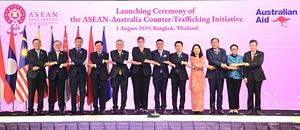Last week in Thailand at the ASEAN-Australia Ministerial Meeting, Australian Foreign Minister Marise Payne launched a new collaboration with ASEAN to attempt to counter human trafficking throughout Southeast Asia. The ASEAN-Australia Counter-Trafficking Initiative is a 10-year $54 million investment that is intended to enhance the criminal justice systems of ASEAN countries in their response to human trafficking, an issue that remains persistent in the region. The investment continues Canberra’s commitment to practical cooperation with ASEAN countries combined with a focus on values it considers important.
Yet the task of addressing the problem of human trafficking is a considerable one. According to the International Labor Organization’s 2016 analysis there are an estimated 40.3 million people throughout the world who could be considered victims of forced labor or sexual exploitation, and a significant proportion of this figure would be people subjected to being trafficked as a component of their exploitation. Almost 70 percent of these victims are in the Asia-Pacific region.
The extent of the problem within Southeast Asia was highlighted earlier this year when the U.S Department of State released its 2019 Trafficking in Persons Report. The report ranks countries by tiers, set against criteria outlined in the Trafficking Victims Protection Act of 2000. Tier 1 countries are those that are deemed to adhere to the act’s minimum standards, Tier 2 countries are those that have made efforts to improve their responses human trafficking, but haven’t yet reached the requisite criteria, while Tier 3 countries are those that have made no effort to meet the standards. Of the 10 countries in ASEAN, only the Philippines achieved a Tier 1 designation. Myanmar and Laos were designated Tier 3, while Malaysia slipped backwards onto the “Tier 2 watch list.”
This indicates that the issue of human trafficking is significantly embedded within the region. However, it is also an issue that is highly complex and difficult to police. Many trafficked people may initially consent to their own migration, through an intermediary or even of their own accord, and only realize once at their destination they have been deceived and are being exploited. Creating legal structures that can accommodate the nuances of trafficking exploitation can be difficult, especially in countries that already have weak labor laws and large informal economies.
The ASEAN-Australia Counter-Trafficking Initiative has taken a targeted approach in order to “principally engage in the criminal justice response to human trafficking, where Australia has the most to offer, rather than in the more crowded protection or prevention spheres.” While prevention is obviously deemed to be the ultimate goal, having strong judicial frameworks ultimately assists in understanding and tracking the problem. Overall the aim of the program is to assist ASEAN members states to fulfill their own goals that were created with the ASEAN Convention Against Trafficking In Persons, Especially Women and Children (ACTIP).
More broadly, the initiative signals Australia’s continued commitment to engagement with ASEAN that was outlined in the Sydney Declaration in March 2018. The declaration made note that Australia and ASEAN had elevated their relationship to a Strategic Partnership in 2014, and sought to build on this as they “commit to intensify our shared work to shape a secure and prosperous region for our people.” The declaration also made a commitment to advancing gender equality and the empowerment of women. With 75 percent of victims of human trafficking being women and girls, demonstrating a concerted effort to address the issue would be an tangible demonstration of this commitment.
Australia has had an evolving strategic relationship with ASEAN, its member countries forming part of Australia’s geographic region, but outside of its cultural affinity. This is gradually shifting as Australia becomes more demographically Asian, and slowly becomes more Asia-literate, but beyond this there also now seems to be a strong recognition that Southeast Asia is a deeply important region for Australia’s future.
This future is reliant on the region’s continued stability. While destabilization is often characterized by large powerful forces pushed and pulled by state-level actors, it can also be a consequence of millions of small destabilizing events. There should be a recognition that the individual lives that are ruined and traumatized by trafficking and exploitation all constituent their own personal insecurity, and these tragedies can have a cumulative effect on countries and regions.
The Australian government sees itself as a creative middle power, seeking to make solid contributions to regional security issues, and cooperation with ASEAN to tackle a regional scourge like human trafficking demonstates an understanding that fundamental issues of human rights are a key component for wider regional stability. This issue forms an important area where Australia is able to align its values to its broader interests in Southeast Asia.

































